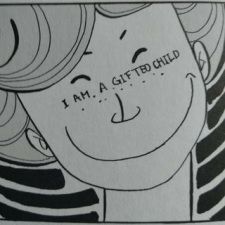Apr 26, 2019
I'm not really sure if I can write a review for these short stories, since they are highly experimental works that can easily go over someone's head, including mine. I should also mention that, even if I have read most of the stories that are listed both in this volume and in "Akai Hana" (which will most likely be also included in this review), not all of them were printed in my country, and I don't know if they are available outside of Japan. So, I haven't read everything yet, but seeing that at the moment of writing this the only other review is a
...
negative one, I wanted to at least say something about why I liked these stories (and why I like the gekiga movement and the works of mangakas such as Yoshihiro Tatsumi or the Tsuge brothers). So, first, I think some context is needed. Earlier, I talked about gekiga as a movement, but it is more accurate to describe it as a sentiment. It's about the sense of drifting that the generation that grew in post war Japan was experiencing, watching the lifestyle they knew being quickly replaced by the alienation of modern society and feeling angry and powerless about it. A feeling that, I think, some people could relate to, even today. The gekiga authors were the first to refuse the concept of manga as mere entertainment and started dealing with more mature subjects as well as employing techniques derived from European cinema, particularly noir and expressionism. Tezuka, who was their main source of inspiration in the use of the language of comics, was in turn inspired by them to write his more mature works (such as "Kirihito" or "MW"). It is thanks to their work that mangas are now as we know them and it is commonly acknowledged that seinen mangas have their roots in gekiga.
As for Yoshiharu Tsuge's stories, they go from deeply symbolic and surreal works (like the eponymous "Nejishiki", or "Yanagiya Shujin") to more realistic ones (like "Ooba Denki Mekki Kougyou-sho" or "Umibe no Jokei"). They are crude, merciless and often have disturbing or otherwise impactful imagery that, together with the lack of any form of closure (to the point they may sometime seem almost pointless and utterly weird), estrange the reader and create that very feeling of alienation the author was probably trying to convey. Even in his more "down to earth" works, the characters feel like they are far away, drowned in their melancholy and unable to communicate to the reader or to each other (like in "Umibe no Jokei"), which makes for some touching moments. The grotesque drawings together with a masterful use of chiaroscuro and detailed, gloomy backgrounds give a sense of oppression and hopelessness that encompasses the readers and draws them in a unique athmosphere which is this author's signature: the balance between real and surreal, tenderness and brutality, is what makes these stories truly interesting. Tsuge is a misanthrope, and it is easy to see why: the products of his mind can be depressing, weird, boring or even pointless to some. But I like them. I hope someone else does, too.
Reviewer’s Rating: 9
What did you think of this review?
Nice
 0
0
Love it
 0
0
Funny
 0
0
Confusing
 0
0
Well-written
 0
0
Creative
 0
0Show all
